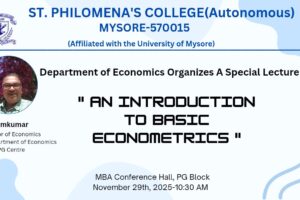
“GEOPOLITICAL ISSUES AND THEIR ECONOMIC IMPACT ON INDIA”
OBJECTIVES OF THE SPECIAL LECTURE
- To understand the meaning and significance of geopolitics in shaping national economic policies.
- To examine how global political tensions and alliances influence India’s trade, investment, and growth dynamics.
- To provide students with insights into India’s position in the global economic landscape amid current geopolitical shifts.
- To explore strategies that help developing nations like India mitigate risks arising from global conflicts and power realignments.
The Postgraduate Department of Economics, St. Philomena’s College (Autonomous), Mysuru, organized a special lecture on the topic “Geopolitical Issues and Their Economic Impact on India” on October 10, 2025, at 10:30 AM in the MBA Conference Hall, PG Block.

The session was presided over by the Head of the Department, who extended a warm welcome to the gathering and introduced the distinguished resource person, Prof. Gopal Singh from Vidyavardhaka College of Engineering, Mysuru.
Dr. Noor Mubasheer, Coordinator, Postgraduate and Research Centre, was also present during the session and graced the occasion with her presence.

Prof. Singh began the lecture by emphasizing the increasing importance of geopolitical stability in determining economic performance in the 21st century. He explained that the interconnected nature of the global economy means that political developments—such as wars, sanctions, and diplomatic relations—directly influence trade flows, oil prices, and financial markets.
The speaker highlighted how India’s economic prospects are deeply tied to its geopolitical engagements with countries like the United States, China, and Russia. He discussed the implications of global supply chain disruptions, energy security challenges, and shifting trade alliances on India’s GDP growth and inflation trends. Drawing attention to India’s strategic position in South Asia, he underlined how foreign policy decisions have become critical instruments of economic diplomacy.
Prof. Singh also examined the economic consequences of the Russia–Ukraine conflict, Israel–Palestine tensions, and Indo–China border issues, linking them to India’s energy imports, defense spending, and global partnerships. The lecture further explored

opportunities for India in becoming a hub for manufacturing and technology through initiatives like Make in India and Atmanirbhar Bharat.

The interactive session that followed allowed students to raise questions on issues such as BRICS expansion, trade wars, and India’s role in the Global South. Prof. Singh responded with insightful analysis, encouraging students to pursue research in international economics and political economy.
OUTCOMES OF THE LECTURE
Students gained a comprehensive understanding of how geopolitical dynamics shape India’s economic strategies. The lecture enhanced awareness of the relationship between political decisions and macroeconomic stability.Participants learned to critically evaluate global events from both economic and policy perspectives.The session inspired students to explore careers and research in international relations, policy analysis, and economic diplomacy.
The special lecture proved to be an enriching academic experience for postgraduate students, bridging the gap between classroom learning and real-world economic challenges. The Department of Economics extends heartfelt gratitude to Prof. Gopal Singh for his valuable insights and to the college administration for supporting initiatives that promote holistic learning and global awareness among students.



